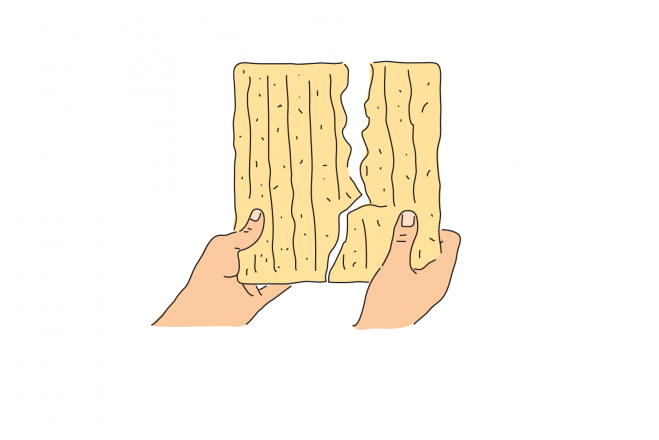The Seder night is the yearly exhibition of Jewish education in the home. We discuss the four types of children which make up Jewish families, their questions, and some answers.
As we sing and eat our way through the night there are plenty of customs and rituals to give definition and meaning to the evening(s).
I would like to focus on a poignant moment during the night. Yachatz, meaning dividing, is when the Seder leader breaks the middle Matzah into two. The smaller piece is maintained in the Matzah bag next to the Maror and Charoset while the bigger one is hidden way and eaten later after the meal at the part of the Seder called Tzafun-meaning hidden.
This is the moment the children at the Seder have been dreaming about since Chanukah. If they somehow manage to acquire the smaller piece -entitled the Afikomen – a present is traditionally promised for its return.
On a practical level we understand this – that since we were slaves in Egypt, we eat broken scraps and impoverished style bread; and not fresh Italian loaves. But there is something much deeper we can learn from this as well.
HaRav Shimon Schwab z”tl reveals a bright and beautiful insight into Yachatz in the name of his father.
He explains that the two pieces of Matzah represent two entirely different worlds. The smaller piece which we pronounce “the bread of affliction” represents “Olam Hazeh” which means the everyday world of that we live in. The world that has ups and downs, sickness and health, and a myriad of imperfections. The bigger piece which is enigmatically prescribed to be eaten AFTER WE ARE SATED-al HaSovah represents “Olam HaBah”- the world to come. The world which everyone has a portion in – if earned. The eternal reward one has to look forward to after a life filled with worthy tasks and productive behavior (perhaps that is why we eat it after we are full).
The seder night is unique because it is the only time that so many Mitzvot are fulfilled in the night time. Aside from lighting Chanukah candles (which is not biblically commanded), holiday mitzvot are reserved for the day time. We shake a Lulav in the day, blow a shofar in the day,……so why do we eat Matzah and read the Haggadah at night? Why is this night different..?
Because Passover has a redemptive personality to it. It is the holiday that reminds us through ritual and prayer that our exile is only temporary. It proves to us by us celebrating it that the same way the Jews were redeemed 3300 years ago from Egypt (at this time), so too will we be redeemed again. It is the time of the year we remind ourselves with comfort that there has been a time and there will be a time when black turned into light and night turns into day. That is why we celebrate the Passover Seder at night.
As we sic our vacuum cleaner on the last Osem crouton let us try and find an hour here and there to prepare for your family Seder(s). How many hours have been invested into these precious family meals. Let’s decorate the cuisine with some well researched commentary on the Haggadah.

